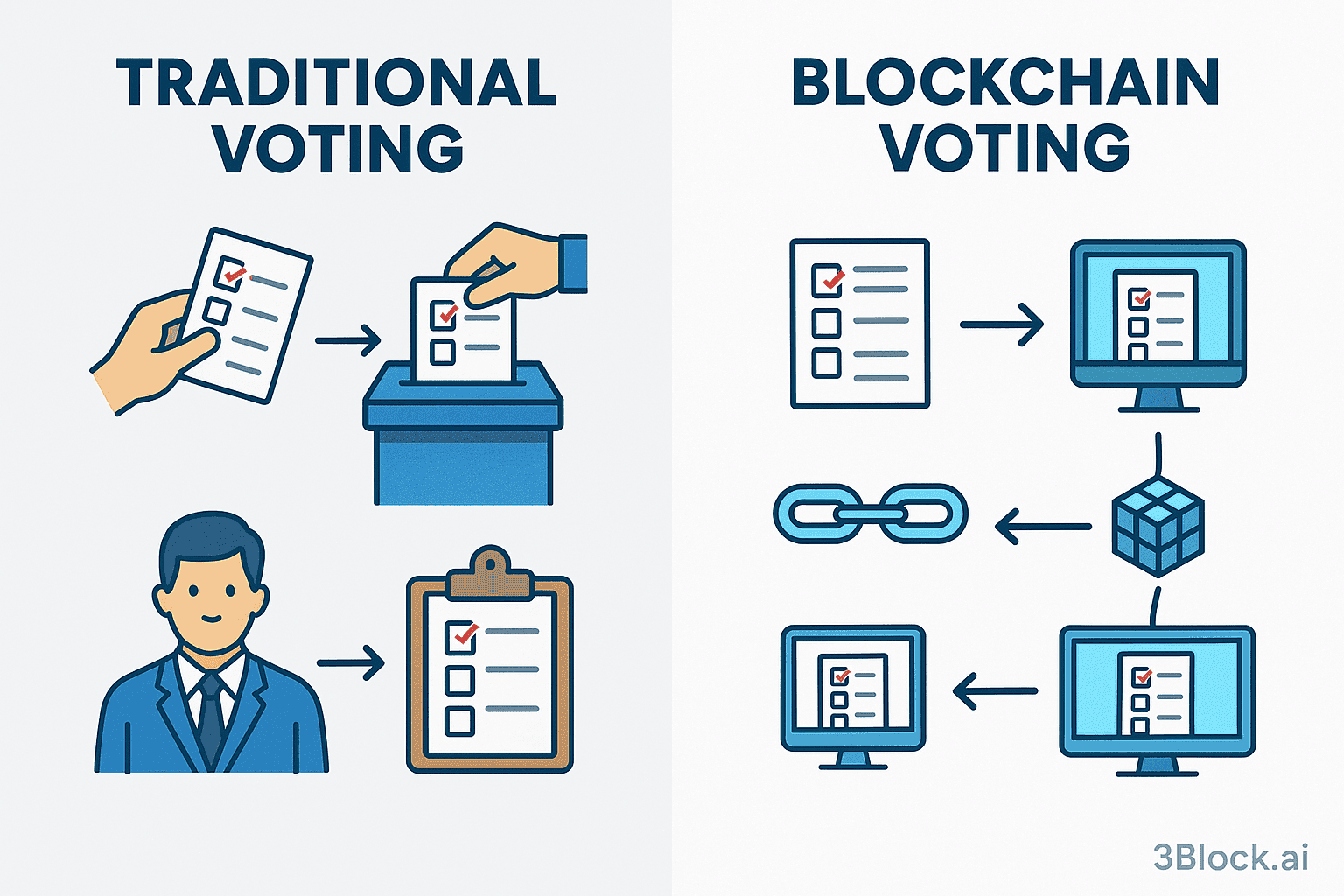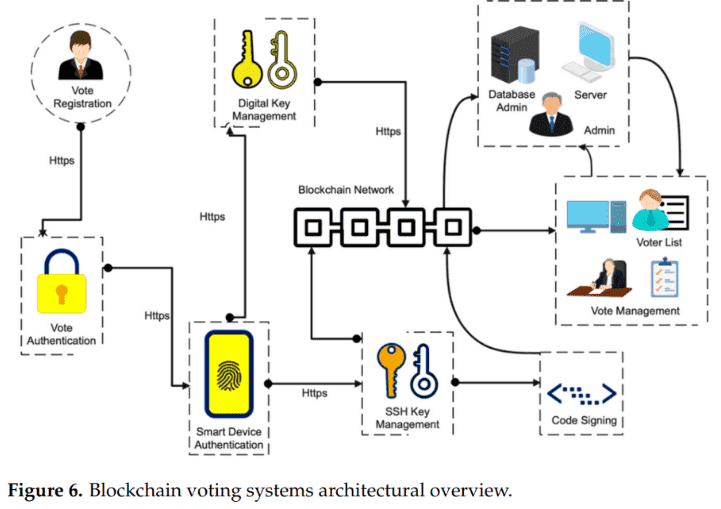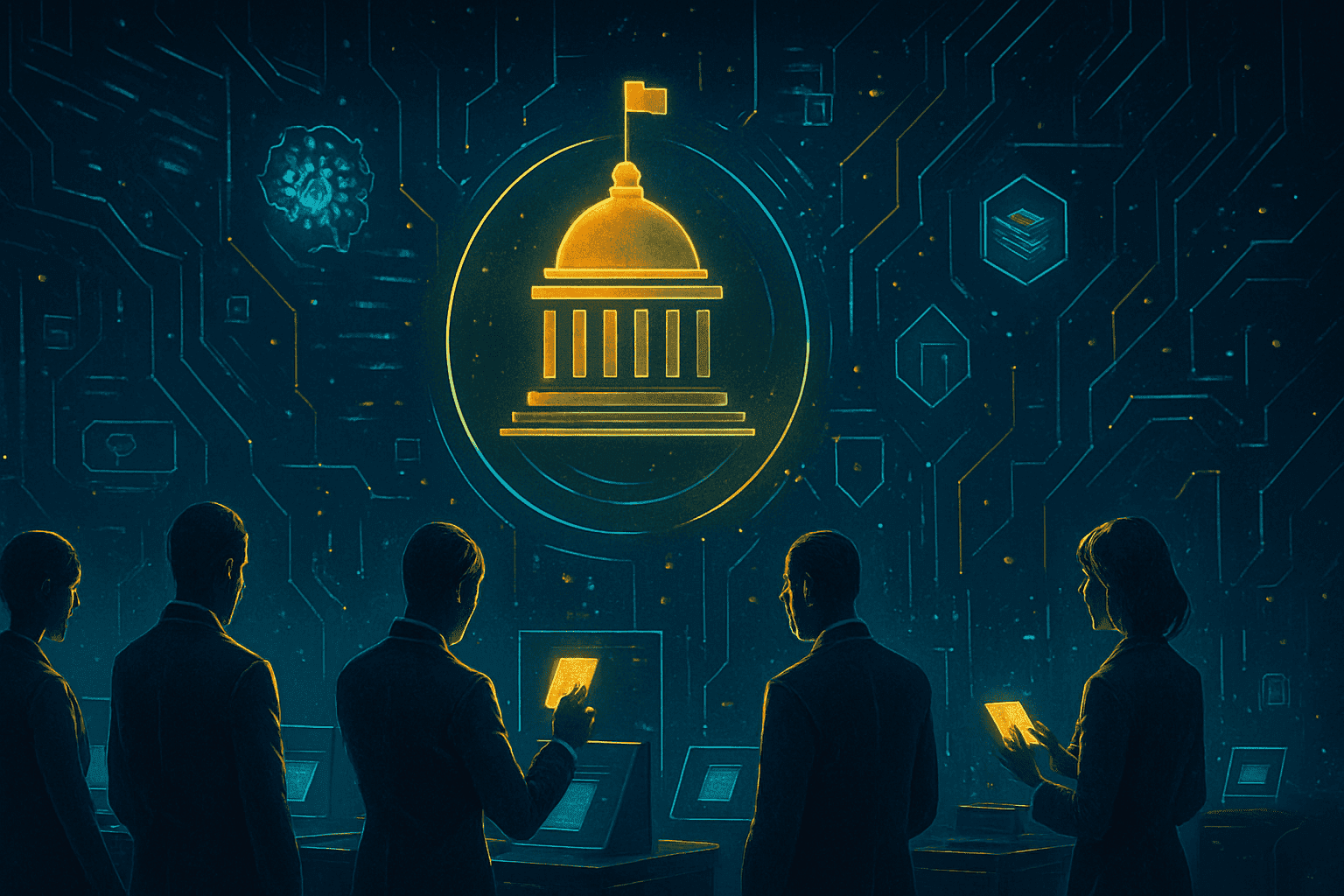Have you ever wondered if it’s feasible to cast a vote comfortably from your home, with the certainty that it will reach its destination without tampering? Without a doubt, the answer lies in blockchain technology, which promises to revolutionize the way we choose our leaders.
What is a blockchain voting system and why is everyone talking about it?
A blockchain voting system is an electoral platform based on blockchain technology in which votes are recorded, verified, and counted entirely digitally. For a quick mental image, imagine a sealed, tamper-proof electoral ledger where your vote is permanently recorded and no one can alter any of the votes inside.
But there’s a catch: the blockchain is public by design, so anyone can check that your vote is there. On the other hand, no one can verify the voting details unless you explicitly tell someone who you voted for. It’s logically built that way.

How blockchain is revolutionizing electronic voting
The digital electoral revolution is no longer a dream. Elections are embracing the blockchain paradigm, and this underlying technology offers innovative solutions to persistent problems in traditional elections.
The Step-by-Step Process
- Secure Registration: You receive a unique private key that acts as your digital signature
- Vote Casting: You select your candidate from any connected device
- Automatic Verification: The system confirms your identity without revealing your choice
- Immutable Record: Your vote becomes part of the blockchain for life
- Instant Tally: Progress is measured in real time as voting advances
What makes this process magical is that each vote emits an irreplaceable digital certificate, you alone can verify in the future that your vote was correctly included in the final count, while preserving ballot secrecy.
Total transparency with absolute privacy
Best of all, although everyone can see on the blockchain all the votes that were cast, your anonymity remains complete. In other words, you see the ballots from the last election, but you cannot see who cast which vote.

Benefits of developing blockchain technology in voting systems
Unbreakable security
Immutability is the most powerful feature of blockchain. Once a vote is recorded, it is “frozen”—changing it would require simultaneously altering thousands of globally distributed copies, an almost impossible task.
A cybersecurity expert noted: “Blockchain technology cannot guarantee 100% that the system won’t be hacked, but if it is, the entity would be aware of the attack,” because the chain of blocks would be broken.
Efficiency and instant results
Forget waiting hours or days for election results. Blockchain systems offer:
- Real-time automatic vote counting
- Elimination of human errors in tallying
- Drastic reduction in operational costs
- Continuous, automatic auditability of the process
Universal accessibility
Blockchain voting truly democratizes access to the vote. Citizens can vote from anywhere in the world, regardless of geographic obstacles.
How will electronic voting with blockchain work?
The technical workings are simpler than you think. Each registered person has access to their personalized platform where they can vote using their unique private key.
System architecture
Developers have designed a triple-verification system that feeds information simultaneously to:
- Registered Political Parties – Receive real-time data
- Central Electoral Body – Maintains the official record
- Public Platform – Allows citizen and media verification
This architecture ensures accessible, traceable, and transparent voting to multiple sources of verification: a system of digital checks and balances.
Custom Cloud Storage
Each electoral organization can customize its special cloud storage space, adapting the system to its specific needs and local legal frameworks.
Could blockchain technology be applied in conducting and registering an electoral process?
It can be implemented perfectly, but we must consider a series of technical and security processes.
Public vs private blockchain: the big decision
Public Blockchain (like Bitcoin):
- Greater decentralization and resistance to attacks
- Fully open and transparent access
- Potential future cryptographic vulnerabilities
- Centralized control by electoral authorities
- Higher processing speed
- Lower resistance to coordinated attacks and possible censorship
Real risks
- As with any system, there are potential vulnerabilities:
- Loss of private keys preventing voting
- Denial-of-service attacks that paralyze the system
- Collusion of validators in private networks
- Identity theft if keys are compromised
Real-World use cases shaping the future
City of Zug, Switzerland: the european pioneer
In 2018, Zug became the first European city to successfully implement a blockchain voting system with 72 out of 240 citizens casting non-binding votes in a pilot to demonstrate technical feasibility.
Latin American innovations
Applications like Follow My Vote in Australia and Voatz in the United States have already showcased the global potential of this technology. Even the Venezuelan opposition used Voatz in 2020 for their consultation, proving that blockchain can offer options under complex political circumstances.
The Immediate Future
Given all the advantages of blockchain in voting—transparency, accuracy, and immutability—it is a viable solution for elections in the near future.
Benefits of private blockchains in electoral contexts
Necessary government control
Private blockchains give electoral authorities the control needed to comply with specific legal frameworks, while retaining the transparency and verifiability benefits of the technology.
Advantages of Using a Private Blockchain
- Easier regulatory compliance
- More efficient identity management
- Optimized transaction speed
- Reduced operational costs
- Customization to local needs
Participatory democracy in the 21st century
Blockchain technology not only makes traditional four-year democracies more efficient but also enables entirely new forms of democratic participation. What if people could regularly vote on specific proposals, engage in participatory budgeting, or more directly influence decisions affecting their own neighborhoods?
Real Citizen Empowerment
Blockchain systems allow:
- Direct participation in public decisions
- Transparent, documented public deliberation
- Automatic, verifiable accountability
- Equal access to political participation
Building Trust in the Digital Age
Distrust in political parties is a global phenomenon, with only 12% of Britons reporting trust in 2023. But blockchain voting systems can legally restore citizen faith in the fundamental institutional forms of the nation.
Absolute transparency combined with guaranteed secrecy represents the balance our democracies yearn for. It’s about democratizing access to political power, not just modernizing our existing political science.
The Future Is Already Here
While some countries debate whether these systems will ever be implemented, others are already enjoying more secure, transparent, and accessible elections. Therefore, the real question isn’t if blockchain will revolutionize electoral processes, but when your country will join the digital revolution.
Because blockchain voting technology isn’t just a technical innovation; it’s the tool that can return real power to citizens, build transparent electoral processes, and deliver the future democracy our societies truly deserve.
